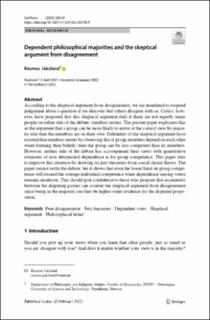| dc.contributor.author | Jaksland, Rasmus | |
| dc.date.accessioned | 2023-01-06T10:06:48Z | |
| dc.date.available | 2023-01-06T10:06:48Z | |
| dc.date.created | 2022-05-02T15:41:00Z | |
| dc.date.issued | 2022 | |
| dc.identifier.citation | Synthese. 2022, 200 (1), . | en_US |
| dc.identifier.issn | 0039-7857 | |
| dc.identifier.uri | https://hdl.handle.net/11250/3041484 | |
| dc.description.abstract | According to the skeptical argument from disagreement, we are mandated to suspend judgement about a question if we discover that others disagree with us. Critics, however, have proposed that this skeptical argument fails if there are not equally many people on either side of the debate: numbers matter. The present paper explicates this as the argument that a group can be more likely to arrive at the correct view by majority rule than the members are on their own. Defenders of the skeptical argument have resisted that numbers matter by observing that if group members depend on each other when forming their beliefs, then the group can be less competent than its members. However, neither side of the debate has accompanied their views with quantitative estimates of how detrimental dependence is for group competence. This paper tries to improve this situation by drawing on jury theorems from social choice theory. The paper cannot settle the debate, but it shows that even the lower limit on group competence will exceed the average individual competence when dependence among voters remains moderate. This should give confidence to those who propose that asymmetry between the disputing parties can counter the skeptical argument from disagreement since being in the majority can thus be higher-order evidence for the disputed proposition. | en_US |
| dc.language.iso | eng | en_US |
| dc.publisher | Springer Nature | en_US |
| dc.rights | Navngivelse 4.0 Internasjonal | * |
| dc.rights.uri | http://creativecommons.org/licenses/by/4.0/deed.no | * |
| dc.title | Dependent philosophical majorities and the skeptical argument from disagreement | en_US |
| dc.title.alternative | Dependent philosophical majorities and the skeptical argument from disagreement | en_US |
| dc.type | Peer reviewed | en_US |
| dc.type | Journal article | en_US |
| dc.description.version | publishedVersion | en_US |
| dc.source.pagenumber | 0 | en_US |
| dc.source.volume | 200 | en_US |
| dc.source.journal | Synthese | en_US |
| dc.source.issue | 1 | en_US |
| dc.identifier.doi | 10.1007/s11229-022-03570-9 | |
| dc.identifier.cristin | 2020775 | |
| cristin.ispublished | true | |
| cristin.fulltext | original | |
| cristin.qualitycode | 2 | |

